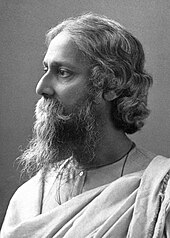Amar Sonar Bangla
| English: My Golden Bengal | |
|---|---|
| আমার সোনার বাংলা | |
 | |
National anthem of | |
| Lyrics | Rabindranath Tagore, 1905[1] |
| Music | Rabindranath Tagore[2] (adapted from a melody by Gagan Harkara[3][4]), 1905[5] |
| Adopted | 10 April 1971 (provisional) 26 March 1972 (official) |
| Preceded by |
|
| Audio sample | |
U.S. Navy Band instrumental version | |
"Amar Sonar Bangla" (Bengali: আমার সোনার বাংলা, lit. 'My Golden Bengal', pronounced [ˈamaɾ ˈʃonaɾ ˈbaŋla]) is the national anthem of Bangladesh.[6][7] An ode to Mother Bengal, the lyrics were written by Bengali polymath Rabindranath Tagore, while the melody is derived from Baul singer Gagan Harkara's "Ami Kothay Pabo Tare", set to Dadra tala.[8][9][10] The modern instrumental rendition was arranged by Bangladeshi musician Samar Das.
Etymology
[edit]The word amar refers to the possessive first-person singular 'my' or '(of) mine'; the word sonar is the adjectival form of the root word sona, meaning 'gold'; and the word sonar, which literally translates as 'golden' or 'made of gold', is used as a term of endearment meaning 'beloved', but in the song, the words Sonar Bangla may be interpreted to express the preciousness of Bengal.
History
[edit]
The song was written in 1905 during the first partition of Bengal, when the ruling British Empire had an undivided province of Bengal Presidency split into two parts; the decision was announced on 20 July by the then-Viceroy of India Lord Curzon, taking effect on 16 October. This divide of Bengal, being along communal lines–East Bengal and Assam having a majority of Muslims and West Bengal having a majority of Hindus–is claimed to have been politically motivated. Along with a host of others, songs such as this were meant to rekindle the unified spirit of Bengal, to raise public consciousness against the communal political divide. The lyrics first appeared in the September issues of Bongodorshon and Baul simultaneously, in 1905. The song along with the musical notation (referred to as swaralipi in Bengali), first appeared in the periodical musical journal Shongeet Biggnan Probeshika in the same month and year. Indira Devi, Tagore's niece, Satyendranath Tagore's daughter, jotted down the musical notation hearing it from Tagore himself (this was the common norm, Tagore singing the song, and someone formally jotting down the musical notations).
Official adaption
[edit]The first ten lines of the original poem constitute the most commonly sung version of Bangladesh's national anthem, adopted in 1971 during the Bangladesh Liberation War. The instrumental orchestra rendition was composed by Samar Das.[11]
Lyrics
[edit]The following provides the lyrics of Amar Sonar Bangla as written by Rabindranath Tagore. Only the first ten bolded lines of the original lyrics are sung as Bangladesh's national anthem. The anthem was translated into English by Syed Ali Ahsan.[12]
| Bengali original[5][13][14][15] | Romanisation (ISO 15919) | IPA transcription[a] | English translation[citation needed] |
|---|---|---|---|
আমার সোনার বাংলা, আমি তোমায় ভালোবাসি। |
Āmār sōnār Bāṅlā, āmi tōmāẏ bhālōbāsi. |
[a.mar ʃo.nar baŋ.la ǀ a.mi to.maj bʱa.lo.ba.ʃi] |
My golden Bengal, thee I love. |
Criticism
[edit]From the late 1970s, Bangladeshi nationalists started to challenge Amar Sonar Bangla as the national anthem and called for adaptation of a more Bangladesh-centric national anthem. In 1975 after the 15 August coup, then President Khondaker Mostaq Ahmed set a committee that proposed the replacement of the anthem with Kazi Nazrul Islam's "Notuner Gaan" or Farrukh Ahmed's "Panjeri".[16] However, the process was halted after his removal. In 1979, in a letter sent to the Cabinet Division, then Prime Minister Shah Azizur Rahman argued that Amar Sonar Bangla was contradictory to the national identity and the culture of Bangladeshis as it was written by a person who had a non-Bangladeshi background, and proposed the patriotic song "Prothom Bangladesh" (lit. 'First is Bangladesh') for the national anthem.[16] During the presidency of Ziaur Rahman, the song was played after Amar Sonar Bangla on national television and government programmes.[16] However, after the death of Rahman in 1981, the initiative was stopped and the song lost its status. Today, Prothom Bangladesh is the party anthem of Bangladesh Nationalist Party.[17]
In 2002, Bangladesh Jamaat-e-Islami Ameer Motiur Rahman Nizami proposed an amendment to the lyrics of Amar Sonar Bangla, citing Islamic values and spirit. However, the Cabinet Division rejected this proposal.[16]
In 2019, Bangladeshi singer Mainul Ahsan Nobel, who was a runner-up in the Indian-Bengali musical show Sa Re Ga Ma Pa Bangla, said that Prince Mahmud's song "Bangladesh" depicted the beauty of Bangladesh far better than Amar Sonar Bangla.[18][19] This remark sparked controversy among Bangladeshis. Later, he apologized for his remark.[19]
In a press conference on 3 September 2024, Abdullahil Amaan Azmi, retired Brigadier General of Bangladesh Army and son of Jamaat-e-Islami Ameer Ghulam Azam, called for a replacement of Amar Sonar Bangla, claiming that Indian government had forced the Provisional Government of Bangladesh to adopt the song. He also argued that "Amar Sonar Bangla" contradicted with the characteristics of Bangladesh, as the song was composed in the context of the partition of Bengal to unite the two Bengals.[20][21] This remark sparked controversy on historical context and the significance of the anthem across the country.[22][23]
Notable performances and covers
[edit]The Ministry of Cultural Affairs planned to stage an event on Bangladesh's 44th independence day, in a bid to have the world record of the most people singing a national anthem simultaneously. Consequently, on 2 March, the ministry launched a program titled Lakho Konthe Sonar Bangla (lit. 'Amar Sonar Bangla in lakh voices') whose main objective was to hold an event with the cooperation of Bangladesh Armed Forces where approximately 300,000 people would sing the national anthem.[24] Several popular Bangladeshi musicians and cultural groups later joined the program.[25]
The record was broken at 11:20 on 26 March 2014 by 254,537 participants at Dhaka's National Parade Ground. The event was attended by the Prime Minister of Bangladesh, Speaker of the Jatiya Sangsad, and all the members of the cabinet.[26] After receiving the required evidence, the Guinness Book of World Records approved the record on 9 April 2014.[27] The record was broken by India on 21 January 2017.[28]
See also
[edit]- "Notuner Gaan", the national march of Bangladesh, written by Kazi Nazrul Islam
- "Ekusher Gaan", a song in the memory of the martyrs of the Bengali language movement
- "Jana Gana Mana", national anthem of India, also written by Rabindranath Tagore
- "Banglar Mati Banglar Jol", the state anthem of West Bengal, also written by Rabindranath Tagore
- Bangamata
- Joy Bangla
Notes
[edit]- ^ See Help:IPA/Bengali and Bengali phonology.
References
[edit]- ^ "Rabindranath Tagore - Songs - swadesh - amar sonar bangla". tagoreweb.in. Retrieved 2024-09-09.
- ^ হাসান, রবিউল (2020-09-06). "আমার সোনার বাংলা, আমি তোমায় ভালোবাসি". The Daily Star Bangla. Retrieved 2024-11-18.
- ^ Rayhan, Abdullah (2024-10-12). "On the national anthem of Bangladesh: An apologetic discourse". The Daily Star. Retrieved 2024-11-18.
- ^ "আমার সোনার বাংলা". banglanews24.com (in Bengali). 2011-06-10. Retrieved 2024-11-18.
- ^ a b "Rabindranath Tagore - Songs - স্বদেশ - আমার সোনার বাংলা". tagoreweb.in. Archived from the original on 2012-07-09. Retrieved 2021-12-26.
- ^ "The Constitution of the People's Republic of Bangladesh - 4. National anthem, flag and emblem". Ministry of Law, Justice and Parliamentary Affairs. Archived from the original on 2014-10-06.
- ^ "Bangladesh: Amar Shonar Bangla". NationalAnthems.me. Archived from the original on 2018-05-26. Retrieved 9 August 2011.
- ^ Folk singer, Swapan Basu, demonstrates the similarity in a live recitation (0:43/8:46 to 1:21/8:46)
- ^ Chakrabarti, Santosh (2004). Studies in Tagore: Critical Essays. Atlantic Publishers & Dist. p. 108. ISBN 9788126903405.
- ^ "Rabindranath Tagore - Essays - Creative Unity - An Indian Folk Religion ()". tagoreweb.in. Retrieved 22 September 2021.
- ^ Komol, Khalid Hasan (2012). "Das, Samar". In Islam, Sirajul; Jamal, Ahmed A. (eds.). Banglapedia: National Encyclopedia of Bangladesh (Second ed.). Asiatic Society of Bangladesh.
- ^ "National Anthem of Bangladesh". bangla2000.com. Retrieved 29 July 2024.
- ^ "জাতীয় সংগীত (পাঠ) - নেত্রকোণা জেলা". www.netrokona.gov.bd. Archived from the original on 2020-07-30. Retrieved 2021-12-26.
- ^ "About Bangladesh-2". www.parjatanbd.com. Archived from the original on 2011-08-11. Retrieved 2021-12-26.
- ^ "আমার সোনার বাংলা | দেশ বরেণ্য ৫০ জন শিল্পীর কন্ঠে জাতীয় সংগীত | National Anthem of Bangladesh". YouTube. 2021-03-25. Archived from the original on 2022-04-15. Retrieved 2022-04-15.
{{cite web}}: CS1 maint: bot: original URL status unknown (link) - ^ a b c d "যে ৩ সময়ে 'জাতীয় সংগীত' পরিবর্তনের উদ্যোগ নেয়া হয়েছিল". Jugantor (in Bengali). 7 August 2019. Archived from the original on 18 November 2023. Retrieved 29 July 2024.
- ^ "Slogan". Bangladesh Nationalist Party.
- ^ "'Sa Re Ga Ma Pa' second runner up Nobel makes controversial comments on Bangladesh's national anthem 'Amar Sonar Bangla'". Times of India. 3 August 2019. Retrieved 30 July 2024.
- ^ a b "'জাতীয় সংগীত' নিয়ে মন্তব্য করে নতুন বিতর্কে নোবেল". Jugantor. 1 August 2019. Retrieved 30 July 2024.
- ^ "নতুন করে সংবিধান ও জাতীয় সংগীত রচনার দাবি আয়নাঘরফেরত আযমীর". www.kalerkantho.com. 3 September 2024. Retrieved 5 September 2024.
- ^ "জাতীয় সংগীত ও সংবিধান পরিবর্তন চান আমান আযমী". bdnews24.com (in Bengali). Retrieved 5 September 2024.
- ^ "৩ লাখকে ৩০ লাখ বলে ঘোষণা করেছিলেন শেখ মুজিব: ব্রিগেডিয়ার আযমী". Jugantor. 3 September 2024. Retrieved 5 September 2024.
- ^ "Bangladesh's war on Bengali identity picks up pace". New Indian Express.
- ^ "Logo of 'Lakho Konthe Sonar Bangla' unveiled". The Independent. Retrieved 3 June 2014.
- ^ "Bangladesh prepares for another record". New Age. Archived from the original on 6 June 2014. Retrieved 3 June 2014.
- ^ "Bangladesh sets world record singing nat'l anthem". New Age. Archived from the original on 7 June 2014. Retrieved 3 June 2014.
- ^ "Guinness accepts national anthem record". Dhaka Tribune. Retrieved 3 June 2014.
- ^ "Most people singing a national/regional anthem simultaneously". Guinness World Records. Retrieved 22 September 2021.
External links
[edit] Works related to My Golden Bengal at Wikisource
Works related to My Golden Bengal at Wikisource


